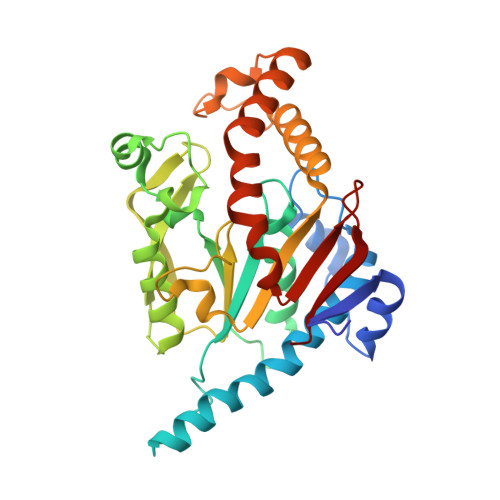Mycobacterium tuberculosis pantothenate kinase: possible changes in location of ligands during enzyme action
Chetnani, B., Das, S., Kumar, P., Surolia, A., Vijayan, M.(2009) Acta Crystallogr D Biol Crystallogr 65: 312-325
- PubMed: 19307712
- DOI: https://doi.org/10.1107/S0907444909002170
- Primary Citation of Related Structures:
2ZS7, 2ZS8, 2ZS9, 2ZSA, 2ZSB, 2ZSD, 2ZSE, 2ZSF - PubMed Abstract:
The crystal structures of complexes of Mycobacterium tuberculosis pantothenate kinase with the following ligands have been determined: (i) citrate; (ii) the nonhydrolysable ATP analogue AMPPCP and pantothenate (the initiation complex); (iii) ADP and phosphopantothenate resulting from phosphorylation of pantothenate by ATP in the crystal (the end complex); (iv) ATP and ADP, each with half occupancy, resulting from a quick soak of crystals in ATP (the intermediate complex); (v) CoA; (vi) ADP prepared by soaking and cocrystallization, which turned out to have identical structures, and (vii) ADP and pantothenate. Solution studies on CoA binding and catalytic activity have also been carried out. Unlike in the case of the homologous Escherichia coli enzyme, AMPPCP and ADP occupy different, though overlapping, locations in the respective complexes; the same is true of pantothenate in the initiation complex and phosphopantothenate in the end complex. The binding site of MtPanK is substantially preformed, while that of EcPanK exhibits considerable plasticity. The difference in the behaviour of the E. coli and M. tuberculosis enzymes could be explained in terms of changes in local structure resulting from substitutions. It is unusual for two homologous enzymes to exhibit such striking differences in action. Therefore, the results have to be treated with caution. However, the changes in the locations of ligands exhibited by M. tuberculosis pantothenate kinase are remarkable and novel.
- Molecular Biophysics Unit, Indian Institute of Science, Bangalore, India.
Organizational Affiliation:


















